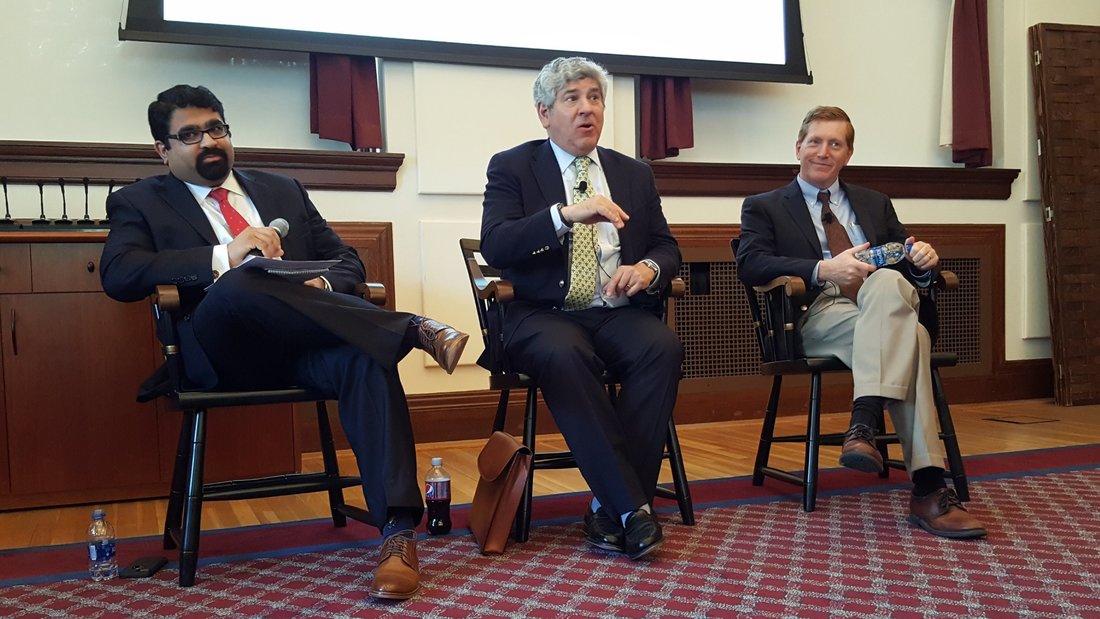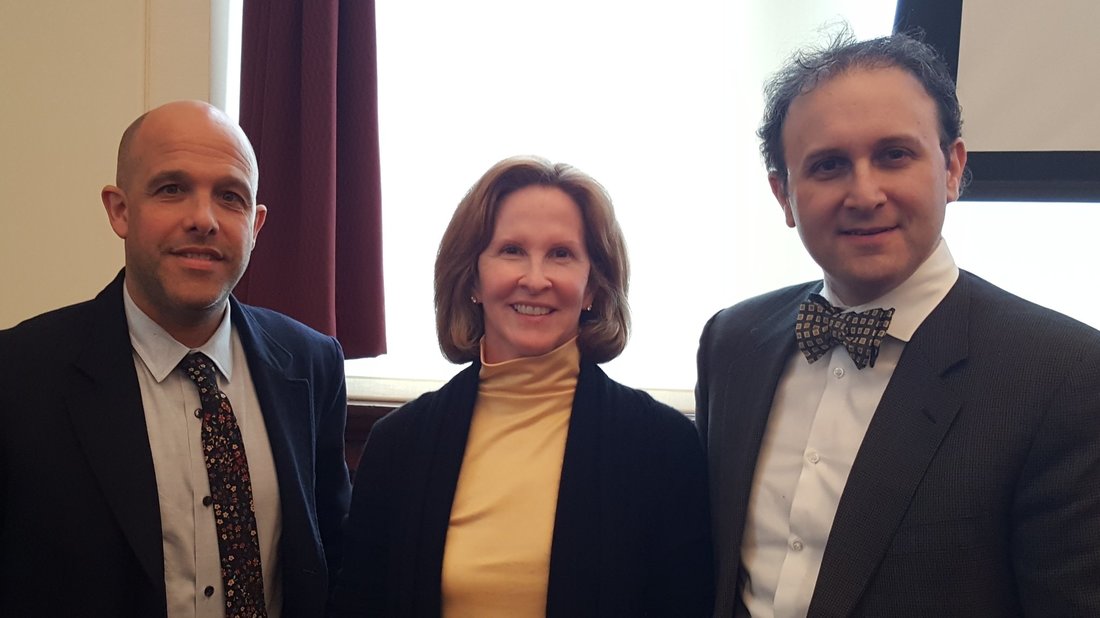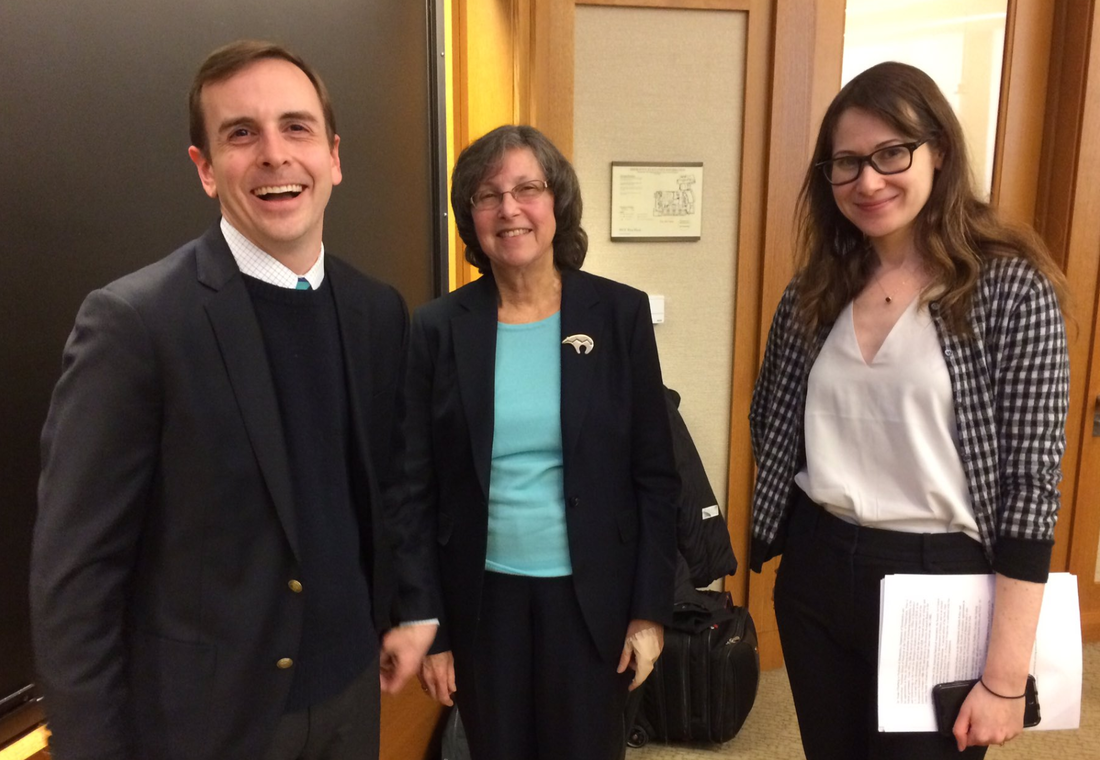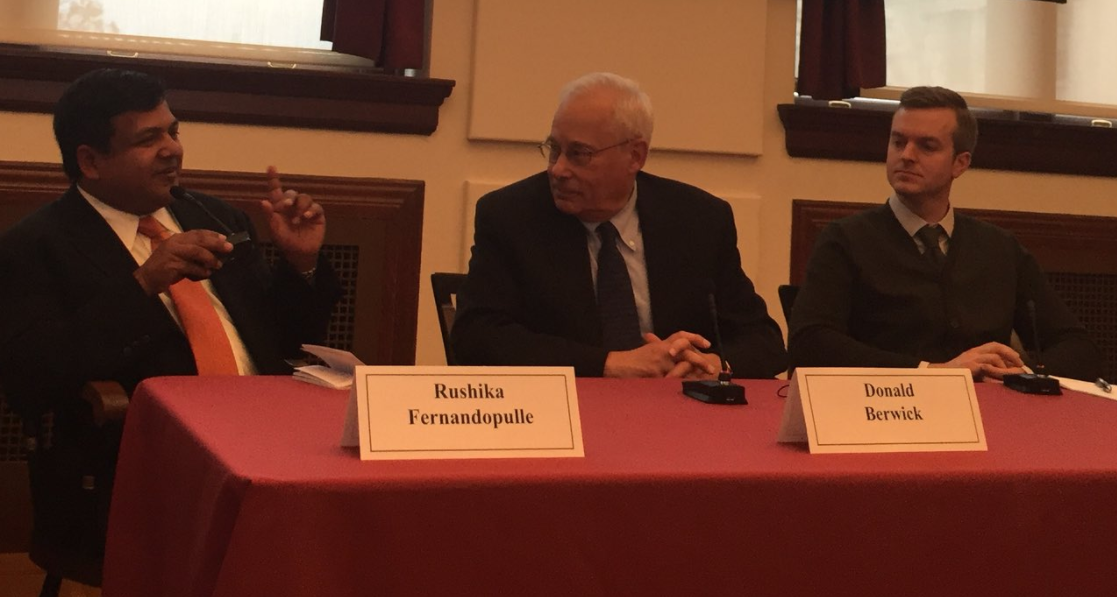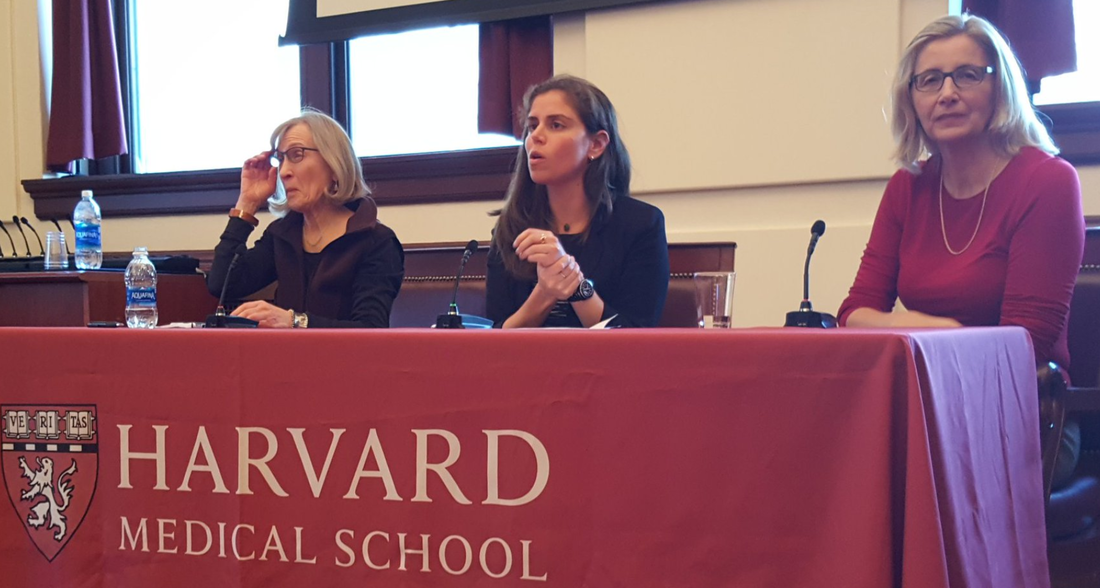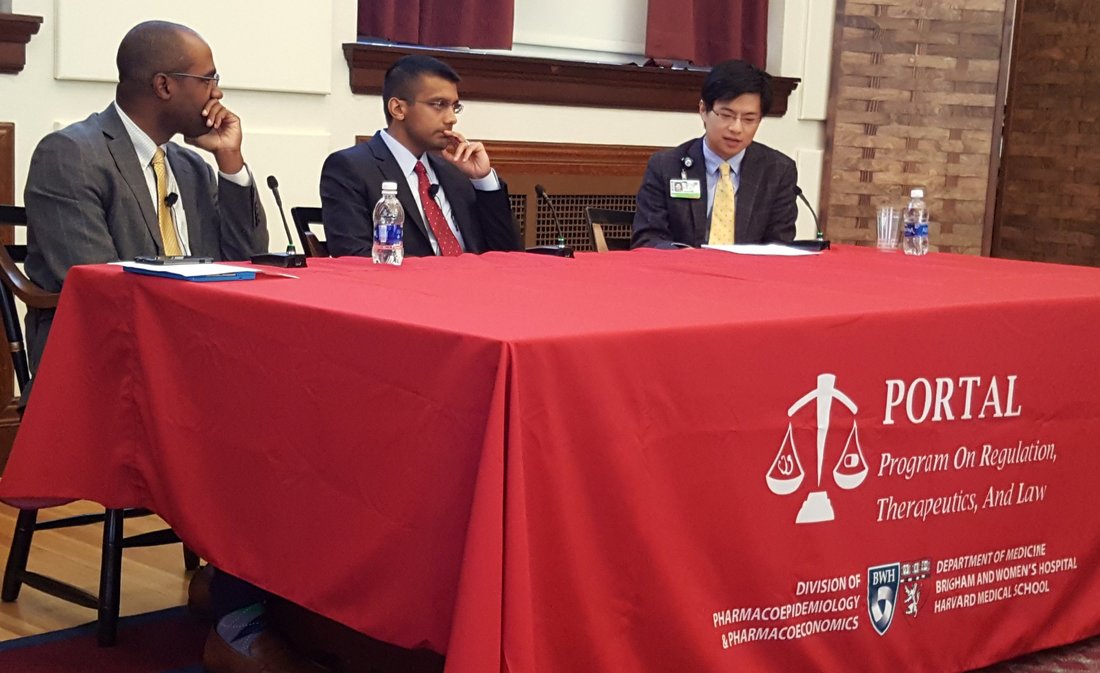PORTAL runs a monthly seminar series that convenes two experts from different fields or vantage points to discuss how various aspects of therapeutic development and use are affected by ethical norms, laws, and regulations. These are organized in conjunction with the HMS Center for Bioethics supported by the Oswald DeN. Cammann Fund at Harvard University.
You may join the discussion on Twitter before, during, or after each event by following @PORTAL_Research and using the hashtag #policyethx.
You may join the discussion on Twitter before, during, or after each event by following @PORTAL_Research and using the hashtag #policyethx.
Health Policy & Bioethics Consortia 2017-2018
Responding to High Drug Prices: What Should Patients and Payors Do?
May 11, 2018 | Harvard Medical School
High drug costs reduce patient adherence and lead to worse outcomes. The process for translating a drug’s price, set by the manufacturer, to the cost paid by patients and health care institutions is complex and involves a number of different actors. Can we develop policies that optimize pharmaceutical spending to ensure that patients can access the products they need and to promote cost-effective use of products?
May 11, 2018 | Harvard Medical School
High drug costs reduce patient adherence and lead to worse outcomes. The process for translating a drug’s price, set by the manufacturer, to the cost paid by patients and health care institutions is complex and involves a number of different actors. Can we develop policies that optimize pharmaceutical spending to ensure that patients can access the products they need and to promote cost-effective use of products?
|
EXPERTS:
Michael S. Sherman, M.D., M.B.A., M.S. Chief Medical Officer and Senior Vice President, Harvard Pilgrim Health Care Lecturer, Harvard Medical School Timothy G. Ferris, M.D., M.P.H. Senior Vice President of Center for Population Health Associate Professor of Medicine, Massachusetts General Hospital and Harvard Medical School MODERATOR: Ameet Sarpatwari, J.D., Ph.D. Assistant Director, Program On Regulation, Therapeutics, And Law (PORTAL) Instructor in Medicine, Harvard Medical School |
Rooting Out Health Care Fraud: Tales from the Front Line
March 9, 2018 | Harvard Medical School
By some measures, as much as five percent of health care spending can be linked to fraud and dangerous practices of for-profit medical product companies --- resulting in widespread negative health outcomes. Health care providers and others directly involved in the health care marketplace are often in an optimal position to recognize problematic business practices.
How do medical care professionals optimally respond to fraud that they observe? What are the strategies used to try to silence them and how do we promote an ethical culture within science, medicine, and business?
March 9, 2018 | Harvard Medical School
By some measures, as much as five percent of health care spending can be linked to fraud and dangerous practices of for-profit medical product companies --- resulting in widespread negative health outcomes. Health care providers and others directly involved in the health care marketplace are often in an optimal position to recognize problematic business practices.
How do medical care professionals optimally respond to fraud that they observe? What are the strategies used to try to silence them and how do we promote an ethical culture within science, medicine, and business?
|
EXPERTS:
Joan Gallagher Former sales representative, InterMune Pieter Cohen, M.D. Associate Professor of Medicine, Cambridge Health Alliance and Harvard Medical School MODERATOR: Aaron S. Kesselheim, M.D., J.D., M.P.H. Director, Program On Regulation, Therapeutics, And Law (PORTAL) Associate Professor, Harvard Medical School |
Clinical Trials in Times of Public Health Crisis
February 9, 2018 | Harvard Law School
In the past several years, the United States has struggled to respond to viral outbreaks, such as Ebola and Zika. There is now an awareness of the need to rapidly develop vaccines and treatments for epidemics that can quickly spread from country to country. But questions remain as how to best conduct clinical trials and development of vaccines in the context of an epidemic or outbreak. Join two health policy experts in examining the appropriate conduct of clinical trials during public health emergencies.
February 9, 2018 | Harvard Law School
In the past several years, the United States has struggled to respond to viral outbreaks, such as Ebola and Zika. There is now an awareness of the need to rapidly develop vaccines and treatments for epidemics that can quickly spread from country to country. But questions remain as how to best conduct clinical trials and development of vaccines in the context of an epidemic or outbreak. Join two health policy experts in examining the appropriate conduct of clinical trials during public health emergencies.
|
EXPERTS:
Susan Ellenberg, Ph.D. Professor of Biostatistics and Epidemiology University of Pennsylvania Perelman School of Medicine Jason L. Schwartz, Ph.D. Assistant Professor Yale School of Public Health MODERATOR: Carmel Shachar, J.D., M.P.H. Executive Director Petrie-Flom Center for Health Law Policy, Biotechnology, and Bioethics Harvard Law School |
Revolutionizing Delivery of Health Care
December 8, 2017 | Harvard Medical School
The US health care system is characterized by substantial costs, but high spending often does not translate into improved outcomes, particularly when compared to other comparable systems around the world. We will review whether there are policies that could help redirect the health care system. What are the appropriate goals of the health care system, and how can we better emphasize characteristics such as quality, efficiency, and responsiveness?
December 8, 2017 | Harvard Medical School
The US health care system is characterized by substantial costs, but high spending often does not translate into improved outcomes, particularly when compared to other comparable systems around the world. We will review whether there are policies that could help redirect the health care system. What are the appropriate goals of the health care system, and how can we better emphasize characteristics such as quality, efficiency, and responsiveness?
|
EXPERTS:
Donald M. Berwick, M.D. Former Administrator, Centers for Medicare and Medicaid Services President Emeritus and Senior Fellow, Institute for Healthcare Improvement Rushika Fernandopulle, M.D., M.P.P. Co-Founder and CEO, Iora Health MODERATOR: Spencer P. Hey, Ph.D. Faculty Member, Harvard Center for Bioethics Research Scientist, PORTAL |
The Gender Gap in Pay and Promotions
November 29, 2017 | Harvard Medical School
Men in the United States, on average, earn higher salaries than women—including in the field of medicine. What are the economic forces, institutional policies, and individual choices that explain the gender gap in pay and promotion? Experts will present economic data for the U.S. and in the medical field, and explore ways that a deeper understanding of gender disparities can inform efforts to promote equity and advance the careers of women.
November 29, 2017 | Harvard Medical School
Men in the United States, on average, earn higher salaries than women—including in the field of medicine. What are the economic forces, institutional policies, and individual choices that explain the gender gap in pay and promotion? Experts will present economic data for the U.S. and in the medical field, and explore ways that a deeper understanding of gender disparities can inform efforts to promote equity and advance the careers of women.
Caring for High-Need Patients
October 13, 2017 | Harvard Medical School
High-need patients require the most attention from health care providers and the health care system, with the top 1% of patients taking up more than 20% of health care expenditures. We will examine what policies are needed to optimize the care of such patients and whether systems can be designed to better serve their needs. What policy-level actions are needed to support the spread and scale of evidence-based programs?
October 13, 2017 | Harvard Medical School
High-need patients require the most attention from health care providers and the health care system, with the top 1% of patients taking up more than 20% of health care expenditures. We will examine what policies are needed to optimize the care of such patients and whether systems can be designed to better serve their needs. What policy-level actions are needed to support the spread and scale of evidence-based programs?
|
EXPERTS:
Dave Chokshi, M.D., M.Sc. Chief Population Health Officer of OneCity Health Senior Assistant Vice President, New York City Health & Hospitals Julian J. Harris, M.D., M.B.A. President, CareAllies, Inc. MODERATOR: Jing Luo, M.D., M.P.H. PORTAL Faculty Instructor in Medicine Harvard Medical School |
The Ethics of Health Care Reform
September 15, 2017 | Harvard Medical School
Congress has been locked in debate over the last year about repealing the Affordable Care Act. There have been numerous controversies over the process used, as well as the outcome achieved. We will reflect on the changes and the rhetoric that has emerged around health and the government’s role in providing a safety net. How should elected representatives weigh the short-term and long-term health care needs of their constituents in these contexts? What were the roles that health care providers and patients played in the debate, and how could they have been more effective?
September 15, 2017 | Harvard Medical School
Congress has been locked in debate over the last year about repealing the Affordable Care Act. There have been numerous controversies over the process used, as well as the outcome achieved. We will reflect on the changes and the rhetoric that has emerged around health and the government’s role in providing a safety net. How should elected representatives weigh the short-term and long-term health care needs of their constituents in these contexts? What were the roles that health care providers and patients played in the debate, and how could they have been more effective?
|
|
EXPERTS:
John E. McDonough, Dr.P.H., M.P.A. Professor of the Practice of Public Health Harvard T.H. Chan School of Public Health Raul Ruiz, M.D., M.P.H., M.P.P. Emergency Medicine Physician & Member of Congress, U.S. House of Representatives (California District 36) MODERATOR:
Michael S. Sinha, M.D., J.D., M.P.H. Postdoctoral Fellow Program On Regulation, Therapeutics, And Law (PORTAL) |
|
Program On Regulation, Therapeutics And Law (PORTAL)
Division of Pharmacoepidemiology and Pharmacoeconomics 1620 Tremont Street, Suite 3030 Boston, MA 02120 |


